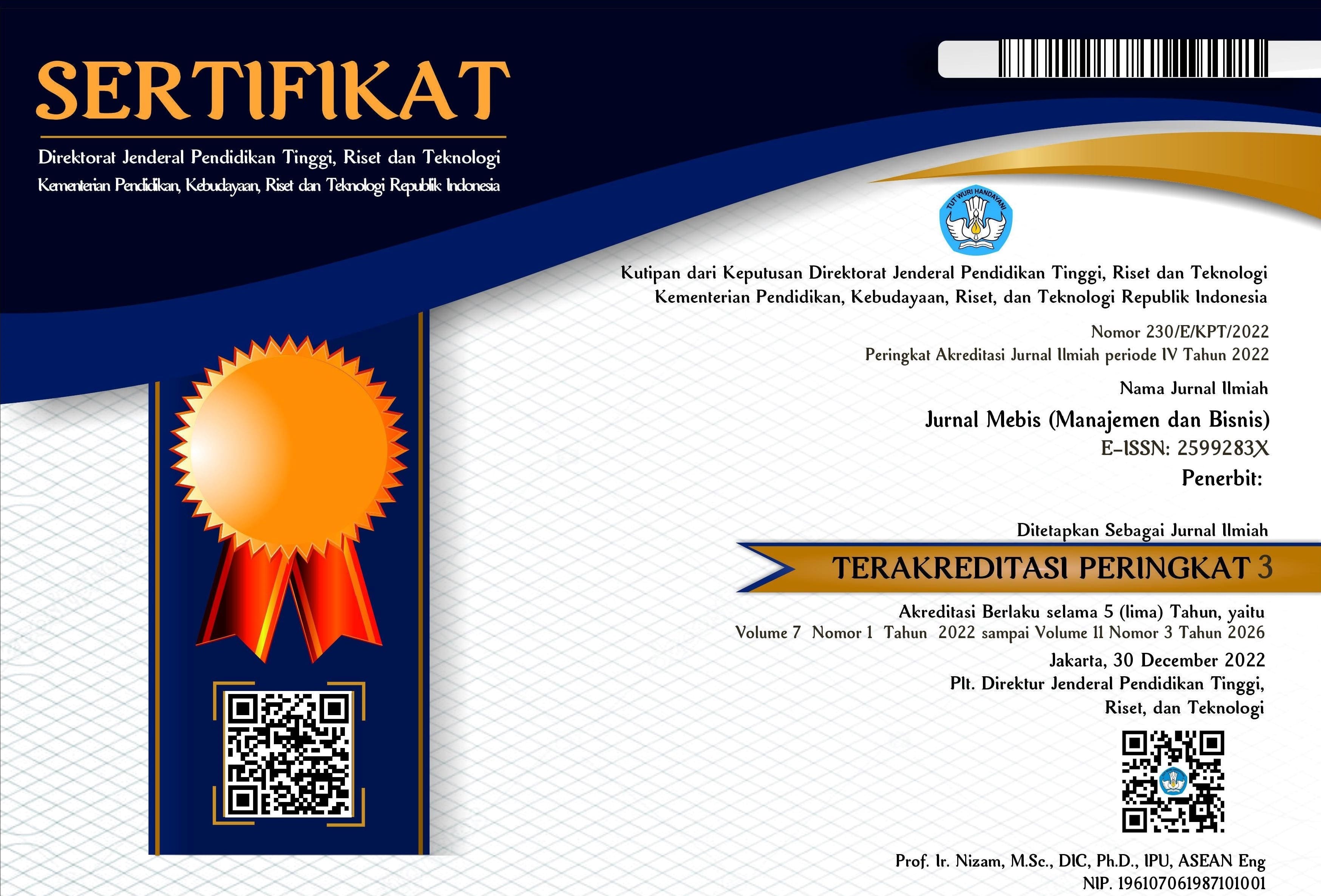The Influence of Workload and Organizational Culture on Employee Performance with Organizational Learning as A Mediating Variable
DOI:
https://doi.org/10.33005/mebis.v10i1.680Keywords:
Workload, Organizational Culture, Organizational Learning, Employee PerformanceAbstract
This study aims to examine and analyze the influence of workload and organizational culture on employee performance, with organizational learning as a mediating variable at the Inspectorate Office of Central Maluku Regency. This research adopts a quantitative approach and, based on the level of explanation, is classified as associative research. Data were collected through questionnaires, observations, and documentation, and were analyzed by testing hypotheses and identifying the relationships between variables using path coefficient correction through Smart PLS version 4.0. The results indicate that both workload and organizational culture have a direct, positive, and significant effect on employee performance and organizational learning. Furthermore, organizational learning also has a direct, positive, and significant effect on employee performance. However, organizational learning does not mediate the relationship between workload and employee performance. In contrast, it successfully mediates the relationship between organizational culture and employee performance, with a positive and significant effect at the Inspectorate Office of Central Maluku Regency.
Downloads
References
Al-Husseini, S. (2023). Intellectual capital dimensions and employee performance: the mediating role of organizational learning. Cogent Business And Management, 10(3), 1–22. https://doi.org/10.1080/23311975.2023.2284437
Antunes, H. De J. G., & Pinheiro, P. G. (2020). Linking knowledge management, organizational learning and memory. Journal Of Innovation And Knowledge, 5(2), 140–149. https://doi.org/10.1016/j.jik.2019.04.002
Bua, C. N. T., Krisnandi, H., Digdowiseiso, K., & Salleh, H. S. (2024). The effect of workload, work discipline, and work from home system on employee performance during the covid-19 pandemic. International Journal Of Social Service And Research, 4(01), 178–189. https://doi.org/10.46799/ijssr.v4i01.686
Creswell, J. W., & Creswell, J. D. (2023). Research Design: Qualitative, Quantitative, And Mixed Methods Approaches (6th Ed.). SAGE Publications, Inc.
Farras, M. F., Hadian, D., Hardiyana, A., Tinggi, S., & Pasundan, I. E. (2024). The influence of transformational leadership and organizational culture on employee performance (study of one the companies operating in the field of publishing and book trading in the city of Bandung). Acman: Accounting And Management Journal, 4(1), 20–28. https://doi.org/10.55208/aj.v4i1.128 24
Giovany, R., & Suyana, H. (2024). Enhancing employee performance : the effect of job satisfaction , motivation , workload , and work discipline. Human Capital And Organizations, 2(1), 24–34. https://doi.org/10.58777/hco.v2i1.276
Hajiali, I., Muhammad, A., Kessi, F., Prihatin, E., & Sufri, M. (2022). Determination of work motivation , leadership style , employee competence on job satisfaction and employee performance. Golden Ratio Of Human Resource Management, 2(1), 57–69. https://doi.org/10.52970/grhrm.v2i1.160
Hasan, H. (2023). Effect of organizational culture on organizational learning, employee engagement, and employee performance: study of banking employees in Indonesia. Problems And Perspectives In Management, 21(3), 471–482. http://dx.doi.org/10.21511/ppm.21(3).2023.38
Khan, F. N., Sehrawat, N., & Singh, S. (2021). The impact of hr practices on perceived gender sensitivity and gender bias: a multilevel analysis of hotel industry. Jindal Management Journal, 10(1). https://doi.org/10.1177/22786821211001769
Kosch, T., Karolus, J., Zagermann, J., Reiterer, H., Schmidt, A., & Woå°Niak, P. W. (2023). A survey on measuring cognitive workload in human-computer interaction. ACM Computing Surveys, 55(13s). https://doi.org/10.1145/3582272
Lam, L., Nguyen, P., Le, N., & Tran, K. (2021). The relation among organizational culture, knowledge management, and innovation capability: its implication for open innovation. Journal Of Open Innovation: Technology, Market, And Complexity, 7(1), 1–16. https://doi.org/10.3390/joitmc7010066
Longo, L., Wickens, C. D., Hancock, P. A., & Hancock, G. M. (2022). Human mental workload: a survey and a novel inclusive definition. Frontiers In Psychology, 13(June), 1–26. https://doi.org/10.3389/fpsyg.2022.883321
Pandingan, G., Malau, H., & Siagian, H. (2024). The influence of leadership and organizational culture on employee performance at PT Medan Adventist Hospital. International Journal Of Business, Law, And Education (IJBLE), 4(1), 1098–1113. https://doi.org/10.62872/ysssx164
Siswadi, S. R. N., Muis, M., Thamrin, Y., Russeng, S. S., Naiem, F., & Manyullei, S. (2024). The effects of work stress and workload on job satisfaction with its impact on employee performance at PT. Industrial Kapal Indonesia (Persero). Journal Of Law And Sustainable Development, 12(1), 1–13. https://doi.org/10.55908/sdgs.v12i1.3023
Sugiyono. (2022). Metode Penelitian Kuantitatif, Kualitatif, Dan R&D. Alfabeta.
Udin. (2023). Linking transformational leadership to organizational learning culture and employee performance: the mediation-moderation model. International Journal Of Professional Business Review (JPB), 8(3), 1–17. https://doi.org/10.26668/businessreview/2023.v8i3.1229
Udin, U., Dharma, R. D., Dananjoyo, R., & Shaikh, M. (2023). The role of transformational leadership on employee performance through organizational learning culture and intrinsic work motivation. International Journal Of Sustainable Development And Planning, 18(1), 237–246. https://doi.org/10.18280/ijsdp.180125
Widiastuti, Y., & Yulihasri. (2021). Pengaruh beban kerja dan kecerdasan emosional terhadap kinerja perawat dengan stres kerja sebagai variabel mediasi pada Rumah Sakit Universitas Andalas. Menara Ekonomi, VII(3), 87–98. https://doi.org/10.31869/me.v7i3.2961













